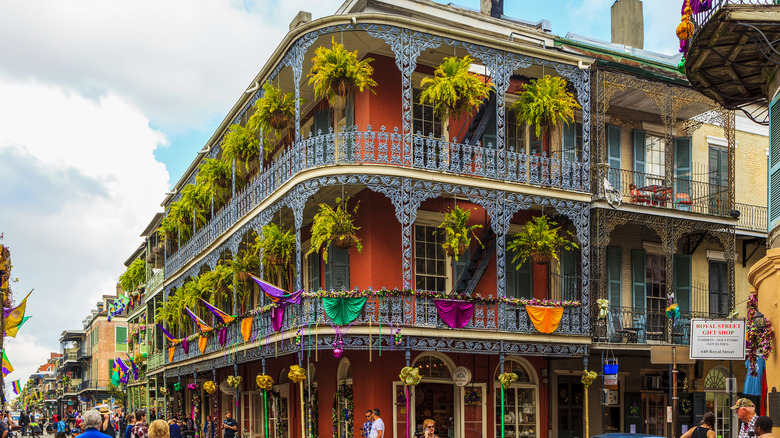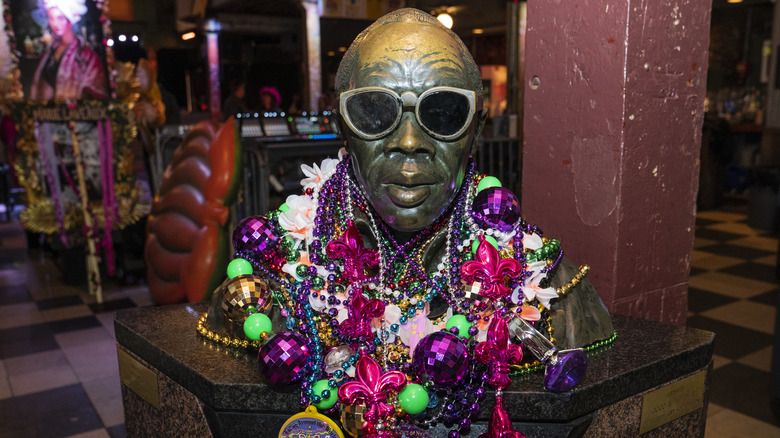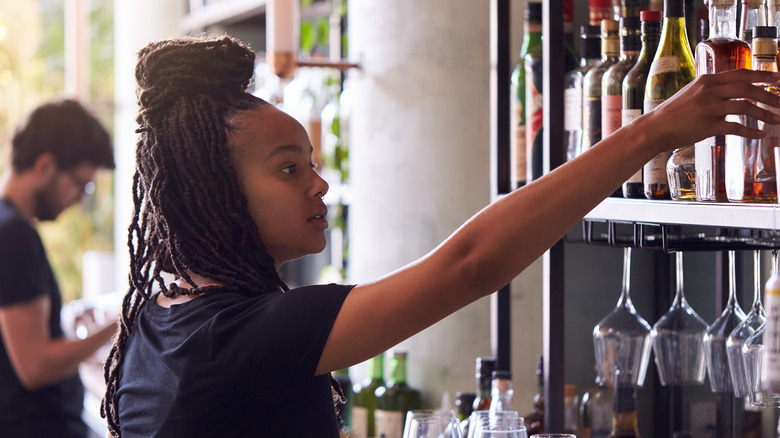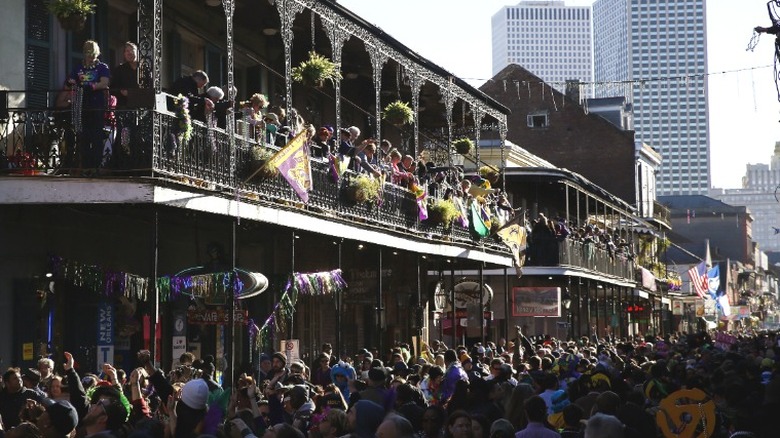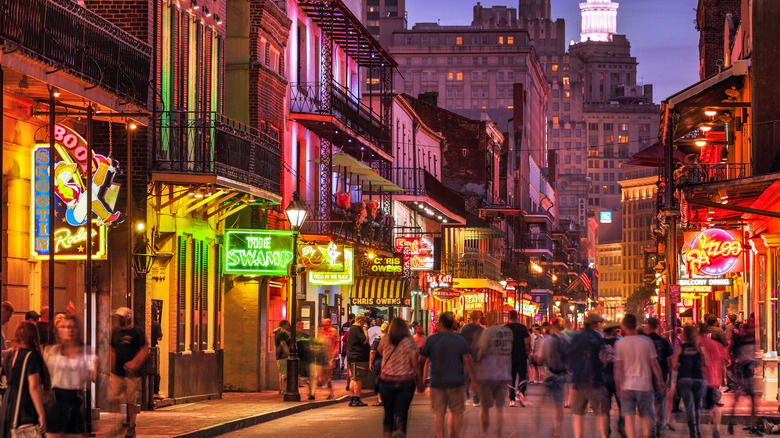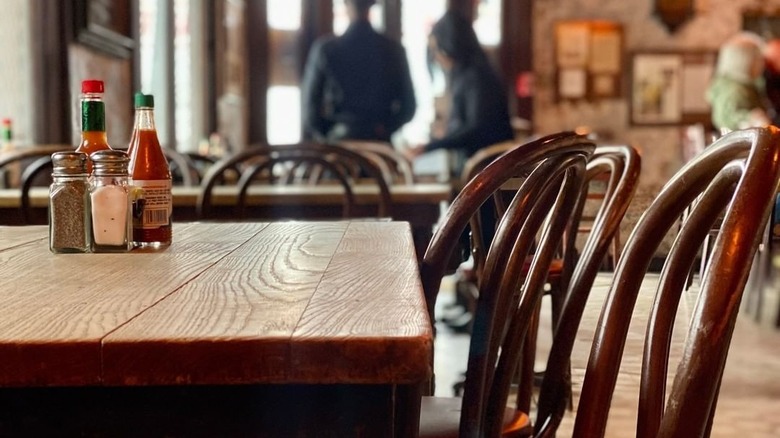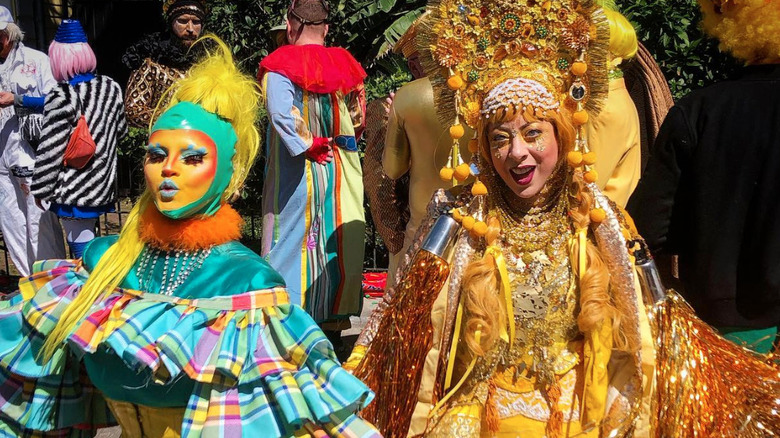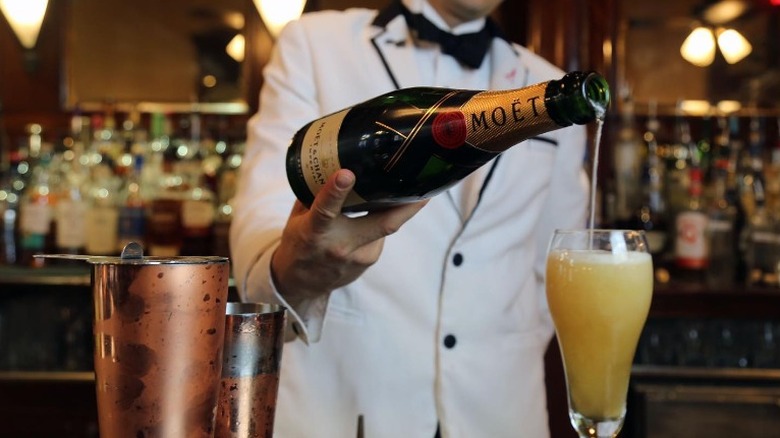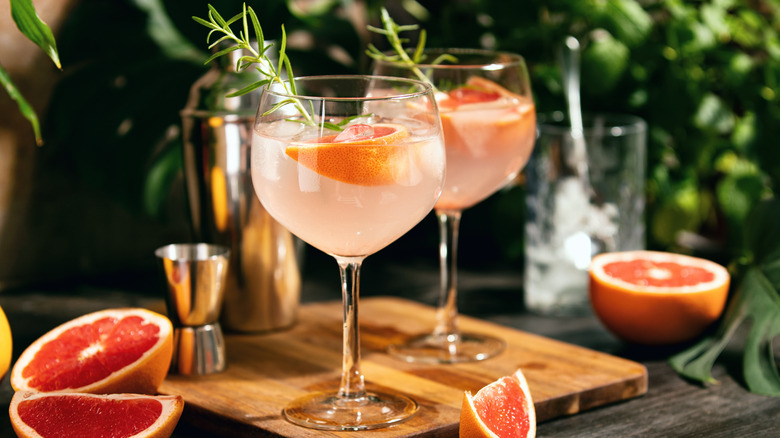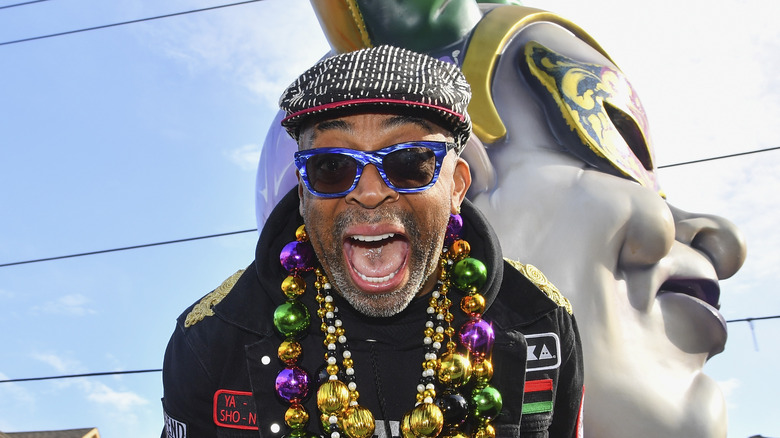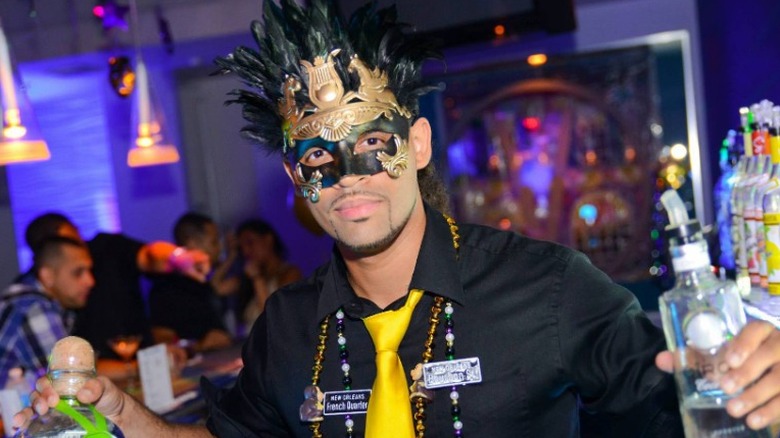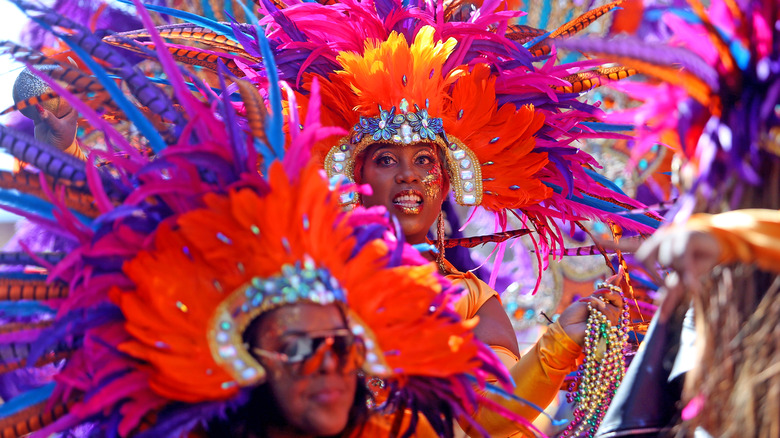What It's Like To Work At A New Orleans Bar During Mardi Gras
It might surprise you to learn that Mardi Gras didn't originate in New Orleans, Louisiana. Despite the Crescent City's undisputed reputation as the home of the festive period, carnival season — and the pinnacle moment of Fat Tuesday — it has a global history. Still, nobody does it quite like the Big Easy. Mardi Gras has become entwined in New Orleans' history as much as New Orleans has taken ownership of it. And, along the way, a certain kind of reputation has budded.
It's true that the original (and current) meaning of Mardi Gras revolves around combining enjoyment and gaiety with a slight bit of decadence. Yet the holiday also has religious connotations as a time to moderately indulge while preparing for the austere commitment of the Lenten season. Nevertheless, over the years, media coverage has shown an outsized focus on the tawdry parts of Fat Tuesday. Combined with the lax liquor laws on the streets of New Orleans, this has led to an outstanding reputation as a period known purely for debauchery.
However, we've worked our fair share of Mardi Gras while living and waiting tables in New Orleans. While the vibes are certainly high (a party is always around the corner), we can say with certainty that the full story of Fat Tuesday isn't always heard through the raucous noise. To back up this claim, we reached out to some service industry professionals to ask, "What's it like to work in a bar during Mardi Gras?"
It isn't always like what you imagine
For many, Mardi Gras just isn't what you see on television or in movies. According to Kirk Estopinal, partner and bartender of Decatur Street staple Cane & Table, Mardi Gras is most about tradition and culture. It's a time when families and friends can get together to enjoy one another's company and ready themselves for religious followings. Estopinal says, "We prepare all year round by educating our guests on the many faces of Mardi Gras and trying to give the Mardi Gras season the PR it deserves rather than what it gets."
In short, Mardi Gras is about much more than throwing beads to strangers in hopes of receiving what would be labeled as "indecent exposure" anywhere else.
Similarly, Mardi Gras, which is French for "fat Tuesday," encompasses a much longer period than most out-of-town merrymakers know. As Aimee Keife of Chandelier Bar reminded us, "Many people don't realize that Mardi Gras season actually starts January 6, also known as Kings Day." From there, the Mardi Gras season can run nearly a month-and-a-half, since the date of Fat Tuesday depends on Easter Sunday. However, most of the major carnival celebrations fall within the two weeks preceding Mardi Gras.
Still, this doesn't necessarily exclude partying. According to Chris Montero of Bourbon Street's Napoleon House, "People feel when they come to New Orleans, they have a license to drink to their heart's content. The laissez-faire attitude of New Orleans ... keeps it exciting."
Preparation has to start far in advance
Although local establishments were used to experiencing this boom of pre-pandemic, it's still a huge event to prepare for. The influx is one that most industry professionals agree is a welcome uptick for a tourist-based economy just springing back from the challenges of the past several years.
That said, if you've ever hosted a party, you know that even having five guests in your house can take a week of planning. In a French Quarter bar, that organization starts early. According to Savannah Hernandez, Chief Operating Officer of Bourbon Street's Pour House Saloon, "We started prepping in November with how we thought it would look. But, nothing really prepares you for Mardi Gras because you truly never know what to expect."
A few bar and restaurant combinations, like James Beard-nominated Palm & Pine, prefer to get the ball rolling even earlier. "I would say that serious preparations typically start at least four months ahead of time. This begins with confirming our holiday hours and making adjustments in our reservation system before they go live three months out," said general manager Monica Snoddy. We're tired just thinking about it.
It's incredibly tiring
From our experience as a service industry professional in New Orleans, there are few days that last as long as a Mardi Gras shift. Some years, we hustled through doubles that pushed 12 to 13 hours — and this was outside the bustling French Quarter! For those working in or behind a bar on Bourbon Street, like Savannah Hernandez of Pour House Saloon, the days start early, "Managers have to be in for 7 a.m., and bartenders and staff get here for 10."
A little-known ritual for those who've never experienced Mardi Gras is the midnight sweep of Bourbon Street. Unlike other evenings where the party meets the sun, New Orlean's first responders perform a ritual shut-down of Bourbon establishments at 12 p.m. on Ash Wednesday. The announcement is an official ending to the Mardi Gras festivities, with crowds dispersing and some bars ceremoniously shutting doors. For those making the call to wrap up after the Midnight Sweep, a shift can constitute a 14+ hour day after closing responsibilities. For those that continue to serve incorrigible partiers, the shift extends even further.
Hernandez tells us, "During Mardi Gras, we all go through it ... we are exhausted from the time we wake up till we go to sleep for a solid two weeks. There is no stopping ... The days get earlier and later it seems. At some point, you'll probably forget what day it is but you'll be having the best time."
Sometimes, you aren't actually open for business
One thing we can say about working during Mardi Gras is how special it is to act as a cultural ambassador of the tradition. For guests and for locals, an excited restaurant waiter or bartender can become the face of the season — the one serving drinks, telling stories, and filling you with the delicious New Orleans dishes that mean so much.
Still, with the possibility of an especially long day and a longer carnival season in mind, some New Orleans bars choose to prioritize partaking in Mardi Gras celebrations rather than working them. Says Paul Greagoff, General Manager of Saint Louis Street-based Jewel of the South, "Mardi Gras day is sacred. COVID gave us time to reconsider what our priorities and direction would be. It is very important to us that we close for Lundi Gras and Mardi Gras for the festivities, and Ash Wednesday as a day to recover."
Others, like Kirk Estopinal of Cane & Table, second this notion. "It's a balance between fun for me and providing fun for others ... for example, we are closed on Mardi Gras day and Ash Wednesday. But, we are open for the big parades in the French Quarter."
The beautiful thing about New Orleans is that there is room for both. Without some establishments remaining open, Mardi Gras goers would have few places to get festive. Those that close allow their staff to become part of the culture in a different way.
The staff comes together
Camaraderie is integral to carnival season. From the strangers-turned-friends on parade routes who offer you a delicious slice of Mardi Gras King Cake (or a cold beer) to the members of your marching krewe that are as good as family, this is a time of unity. But few things make you feel closer to someone than being stuck in the weeds with the restaurant printer whirring during hour five out of 12 in your double shift. Among certain bars and restaurants, handling the rush of the crowd in a unified fashion is nothing new.
Chris Montero, executive chef and general manager of Bourbon Street's Napoleon House, tells us, "The kitchen and bar are experienced with this kind of volume, and it helps that the staff has been at the Napoleon House no less than 10 years. For some, it was the first job they had in their 20s, and now they are close to 55 or 60 years old. Servicing the guest is second nature for the employees."
For others, like Savannah Hernandez, COO of Bourbon Street's Pour House Saloon, going through it together means looking out for the staff in a multitude of ways. "We make sure they have an hour break and get to relax at some point during their shift. We make sure they are fed too. Once they are behind the bar, they never stop. We make sure they have security if things get out of hand."
It isn't always the most anticipated time of the year
We've noted the unique, symbiotic relationship between Mardi Gras and New Orleans, and with such a coupling, it's reasonable to expect that it's the peak of the year for the Crescent City. Only, that isn't always the case. Folks in Big Easy like to enjoy themselves and will find a way to show out for just about any reason. By some estimates, there are over 100+ festivals occurring in NOLA every year, jubilating music, food, art, and local history and culture. When asked about the anticipation of Mardi Gras, Abigail Gullo, creative director of the beverage program at Loa Bar told us, "It is probably a tie between this and Festival Season."
Surprisingly, many Mardi Gras bartenders don't actually see carnival as the most anticipated time of the year.
Christoph Dornemann, head bartender at the historic Arnaud's French 75 Bar detailed the times of the year that carries even more excitement than Mardi Gras. According to Dornemann, "While it is a highly anticipated time of year, it's not the most anticipated. The holiday season is much busier, and from a bartender standpoint, Jazz Fest and Tales of the Cocktail can often overshadow business during Mardi Gras."
Chris Montero of Napoleon House supported Dornemann's evaluation, stating, "No, it is not the most anticipated time because as a bar in the French Quarter, a few holidays and times of year rival Mardi Gras — for example, New Year's Eve and Jazz Fest."
You never know what you're going to see
Even with all we've been told about the differences in how Mardi Gras is portrayed compared to what it actually is, the truth is, there is a reason why Fat Tuesday and the carnival season have the reputation that it does — but even this reason (probably) isn't what you think. The thing about New Orleans is that it (again, probably) has more creative people per capita than any other place in the country.
Yes, we're aware that the "probably" is loaded and that this statement is highly subjective and statistically impossible to verify — but hear us out. When you've seen and marched alongside the quality and quantity of breathtaking costumes that the average New Orleanian is capable of crafting, you begin understanding a different layer to the word "revelry." You can't help but parade.
Aimee Keife, manager of the Chandelier Bar, shares her experience. "Large groups like to patronize the bar early to get ready for parades. You never know what and who you'll see, from a costumed group of Marie Antoinettes to a gang of Elvises riding up on scooters. Enjoy the spectacle!"
Likewise, bartenders might enter for a shift to find that the patrons are of the four-legged variety. Monica Snoddy, GM of Palm & Pine, says, "We have a dog-friendly brunch before the Barkus Parade every year." And yes, you should expect those canines to also show up in full costume.
The pace of service can change in an instant
Many service professionals told us that while working the bar on Mardi Gras the tempo of the day can shift quickly. Abigail Gullo of Loa Bar tells us that the momentum has a pattern, "It comes in waves in tune to the running of the parades."
Others, like like Aimee Keife, mentioned that location has a big effect on the day's tempo. "We're centrally located downtown, just a few blocks from the parade route and French Quarter, which makes Chandelier Bar a great meeting point for krewes and revelers ... I like to say it's a wave of glitter and feathers flowing in and out our doors. Always be prepared to fill up at a split second."
Chris Dornemann of Arnaud's French 75 Bar told us that beyond the parades, the flow of service really depends on the needs of the guests. "Most people opt to set up on the parade route overcoming to the French Quarter for a cocktail. Bar occupancy varies widely. We are either packed or quiet because guests are trying to get a drink before and after the parade.
For those at Pour House Saloon, neither feast nor famine affects the vibe. "The ambiance is always fun and festive, regardless if there are four people or 400 people in the building. It can get absolutely chaotic but there's nothing better than the bar being busy and people being loud because they're having such a good time."
You have to take some shortcuts
If 400 people in one bar room sound like a lot, that's because it is. And with that many (or more) thirsty and hungry party-goers chomping at the bit, working in a bar on Mardi Gras means having to set yourself up for success. Turns out, the French kitchen strategy of mise en place is more than just a great cooking tip for home chefs.
We spoke to Laurie Fisher of Dat Dog about how the eatery keeps up with the push of customers throughout the day. Fisher told us, "To handle the extra volume and make sure our guests get fed as quickly as possible, we have a "Speedie Weenie" menu. These are a few of our most popular 'dogs that are good grab n' go options."
Having a quick-service menu is a method of survival on days like this. As executive chef of Napoleon House, Chris Montero told us, his bar can serve upwards of 3,000 to 4,000 Pimm's Cups in the two weekends prior to Fat Tuesday.
Montero continues, "Excuse the pun — the bar is raised during Mardi Gras as the demand for drinks is at an all-time high ... The go-cups are stacked by the hundreds and are restocked within an hour, mainly for the Pimm's cup." But shortcuts are relevant for more than just drinks and food. With abundant road closures, staff has to know the quickest and most direct ways to navigate into their workplace.
Celebrity encounters are common (but privacy is respected)
When we asked our sources to share with us their most star-studded encounters during Mardi Gras, a few were happy to open up. Savannah Hernandez, COO of Pour House Saloon, listed the bar's more recent sitings, including the cast of the television show Supernatural as well as "Man v. Food" host Casey Webb.
Given New Orlean's gravitational pull on culinary and entertainment celebrities alike, it's not unusual to see a prominent face across the bar. Some parades have traditions wherein influential stars or locally-connected people are invited to reign as honorary kings and queens of various krewes, like Spike Lee. Some noble professionals prefer to let those who enter the city keep to themselves.
Per the general manager of Palm & Pine, Monica Snoddy: "I very much respect that what happens at Mardi Gras stays at Mardi Gras. Most of those great stories aren't mine to tell, I was just there to witness."
Kirk Estopinal of Cane & Table concurs, mentioning of celebrity encounters that there have been, "Too many to say. But, it's personal. Mardi Gras is personal."
For Paul Greagoff, manager of Jewel of the South, what's most exciting is the chance to meet locals, be they familiars or famous stars. "If you keep a lookout, you will always run into someone you know. It could be an old friend, a past neighbor, a co-worker, or even in 2016 when Chris Hannah and I ran into Dr. John himself."
The staff is celebrating alongside patrons
Regardless of whether the establishment you work at chooses to open or close on Mardi Gras, you're celebrating. We can personally say that — even when you've been triple-sat while holding a stack of drink orders the height of Benson Tower that hasn't yet been fired through the computer as hot food lay dying in the kitchen window — things are pretty jovial on Fat Tuesday, overall.
It starts with setting the mood. Chris Dornemann, head bartender of Arnaud's French 75 Bar, begins with the tunes. "Our music playlist is different during this time, featuring a lot of New Orleans funk and soul, making the atmosphere high energy."
For establishments that are closer to the major routes, like the Camp Street-situated Loa Bar, staff can even participate in Mardi Gras. "We are surrounded by the parades, so it is always fun to take a break and run out to see friends on the march and catch some throws," says Abigail Gullo.
Others places, like the Pour House Saloon and Palm & Pine, told us about staff traditions of donning modified accessories and partaking in festive customs. At the Pour House, for example, the bartenders choose a preferred number and, for two weeks, don a mask accordingly. Names become numbers, adding enigma and intrigue to the workday. Palm & Pine hosts a special themed day that calls for costumes and a unique menu. At Jewel of the South, staff-chosen King Cakes from across the state are exchanged.
Bartenders want you to be who you are
In the end, being in a bar at Mardi Gras is all about facilitating the joy of the season. For industry professionals, that means witnessing folks become themselves in an accepting environment. According to Kirk Estopinal, partner and bartender at Cane & Table, this is what the city is all about. "Paint your body. Wear a suit. Drink blue drinks. Have a fancy cocktail. New Orleans is about accepting who you are. No clock to punch, just enjoy your life."
At times, the carnival chaos can feel like a hindrance to expectations of fun. According to Abigail Gullo, creative director of Loa Bar's beverage program, the best thing bartenders try to do is engage with the magic of New Orlean rather than letting traffic, pressed staff, or odd restaurant hours be an inconvenience.
No matter how free you intend on living during Fat Tuesday, know that being behind a bar on Mardi Gras is tough work. Chris Dornemann of Arnaud's French 75 Bar tells us, "Living in New Orleans for more than a decade desensitizes you to a lot. What would be shocking to most people becomes expected during Carnival Season. On more than one occasion a guest thought that clothing was optional in the bar, so that's always an interesting conversation."
So remember: Get loose, tip your bartenders, be respectful, and most importantly — heed the words of Dat Dog's Laurie Fisher: "Be a fun drunk, not a mean drunk."
